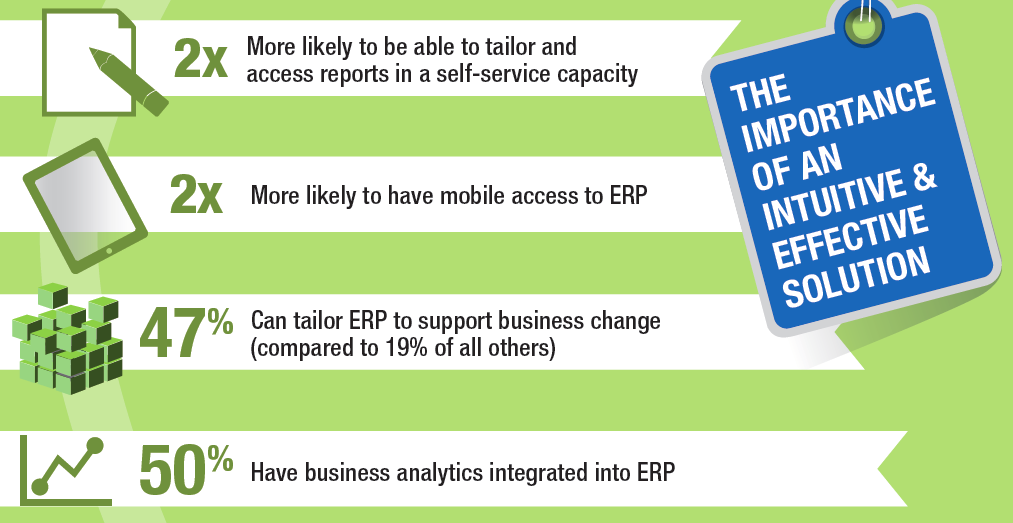When faced with the prospects of getting a new ERP software, some small and medium-sized enterprise (SME) leaders tend to wonder:
- How much do we need to adjust our business logic or our processes to fit the new ERP system?
- Would changing to a new software create conflicts with longstanding business practices?
- Why change? It's not practical to make changes when things are still working
We hear such concerns from SMEs, especially those from more traditional industries. But they’re understandable, because they stem from practical business reasons.
With all the time, money, and resources that go into an ERP implementation, fixing something that ain’t broke (yet) doesn’t seem so practical – on the surface. And the thought of “overhauling” current systems can be overwhelming, too.
But if you’re concerned about short-term practicality, consider this instead: in the long run, a good ERP system can help save your SME money and time, so you can focus on value-added tasks.
To illustrate this, here’s what holding on to old ways can entail.
Business Processes Have An Expiry Date

There's only so far you can go with new wine in old skins.
The semi-unstructured processes many SMEs’ve adopted since day one serve their purposes. And they’ll have even evolved along the way to give them some flexibility to stay competitive.
Even then, there’s a limit to that flexibility: clinging on to existing methods can cause major bottlenecks to your operations and hold you back from growing your business.
Have You Hit That Limit? Recognising Operational Bottlenecks

But how do you detect bottlenecks that hinder growth?
Common indicators you should look out for include:
- Increase in administrative expenses simultaneous with an increase in transaction volumes.
- Employees unable to cope with their workload, leaving them less time to focus on value-added tasks or new projects.
- Unconnected systems, which make it difficult to compile accurate decision-making data.
- Difficulty in managing orders, which lead to recurring stock-outs and missed delivery schedules.
- Delay in responding to simple customer enquiries, e.g. about stock levels.
- Long time spent generating reports, which means you aren’t getting real-time views of decision-making data.
Unclogging Bottlenecks
“But Alythea, we’re just an SME. We’re so focused on staying afloat now that we don’t have the time to puzzle over our business processes.”
It's fair to say fine-tuning the way you work isn’t so straightforward. But ERP systems have been designed to help take on some of the burden.
A good ERP system is designed to optimise your back-office operations and eliminate its bottlenecks. With logjams cleared, you’re free to focus on building and growing your business instead.
Fast Growing SMEs Use ERP
And research shows that good ERP systems are critical to the success of high-growth SMEs. In a study by The Aberdeen Group, researchers found that 96% of the best growing businesses are using ERP solutions.
These SMEs are also:

Furthermore, the benefits they receive are significant and directly related to business growth:
- See operational costs slashed by 11%
- Enjoy 10% profit growth in less than two years
- Are 4 times more likely to successfully forecast and plan demand
- Are 633% more likely to share data with suppliers, customers, resellers etc for greater efficiency
- Are 77% more likely to standardise back-office processes for enhanced productivity
They can also easily find the data they need for faster decisions whenever they need it, giving them that flexibility that they need to succeed in the SME market.
And because ERP solutions centralise and collect core business data plus support operations, reporting, etc. in a single system, successful SMEs are able to work faster with seamless access to accurate, trusted data.
Having the assurance of reliable data is also a good foundation for data analytics: think of it as mining insights that help you make smarter decisions, more quickly.
Understanding Organisational Resistance

With quantifiable benefits like these, what’s preventing SMEs from taking the next step?
The short answer: emotions.
While we’re given to think that business-to-business (B2B) decision making is relentlessly rational, research reveals that emotions continue to cloud our judgements.
When trying to get buy-in for implementing ERP in your company, it helps to understand the emotions behind the organisational resistance to help build a stronger case for ERP. In our experience, they tend to manifest in three ways:
1. Confirmation Bias
More than being resistant to change, we’re all vulnerable to finding information that reinforces our views and filtering out contradictory data.
If you’re familiar with Psychology 101, you’ll recognise this as confirmation bias.
The danger’s that a confirmation-biased mindset can be backwards-looking, not grounded in the now (let alone future-oriented). It can trick us into disregarding changes that’re effective not just now, but in the future.
2. Fear of Tedium
For managers who’re up to their necks in managing the business already, the thought of implementing an ERP system can be daunting.
And given that a new system might present a steep learning curve for some, the double dose of additional tedium can deter some from supporting change.
3. Fear of Being Made Redundant
A good ERP system will automate and streamline daily processes, like strategically managing receivables or inventory.For rank-and-file employees (even managers), this might be a nightmare come true – the fear of being made redundant.
How to Make the Case for ERP in your SME

We’ve established that ERP systems can be a success factor for fast-growing SMEs.
Now, we’ll show you what can you do to tilt the long-term benefits vs short-term flexibility balance in your company’s favour. And more than that, to make a strong case for ERP’s practicality.
Besides helping your audience re-frame their mindsets, your case should achieve three important, yet distinct purposes:
- Showcase the long-term benefits and the potential of lowering total costs – this is where case studies and reports come in handy.
- Focus on long-term practicality, i.e. the elimination of bottlenecks to support business growth.
- Educate bosses/colleagues on how ERP simplifies and improves processes
For example, you can reiterate your boss’s pain points and how that contributes to the overall costs of conducting business. It’ll help as well to demonstrate how they might impede on a long-term company objective or goal, like growing your revenue while staying lean.
Be sure to ask clear, specific ‘what-if’ questions too. This’ll help your audience focus on specific processes, rather than the overwhelming thought of changing an entire system – helping to ease concerns about change
At the end of the day, most SMEs manage a similar range of processes – finance, procurement, logistics or manufacturing, to client-facing processes like sales and customer support.
What sets the successful apart from the struggling is the extent to which they’ve managed to simplify the way they work for greater effectiveness.
For example, we helped one of our SME clients – an award-winning F&B distributor – gain a 40% surge in revenue and a 10% reduction in stock losses after implementing SAP Business One to streamline their processes.
Being Conservative Isn’t Always Practical
The landscape of business is never static, especially amidst today’s volatile market conditions. So it only makes sense that being conservative is never a practical position.
Instead of asking questions like ‘is it practical now’ perhaps the real question is – given the long-term advantages that ERPs provide – is it practical not to move to an ERP system?
If you’re trying to make the case for ERP to doubtful colleagues and management, focusing on the quantifiable and uncovering psychological biases can help you get that buy-in.
Questions? Give us a call and get a free consultation from our ERP experts. You can also check out The Ultimate ERP Software Guide for SMEs below for an in-depth look at some commonly asked ERP software questions -- it's free!




